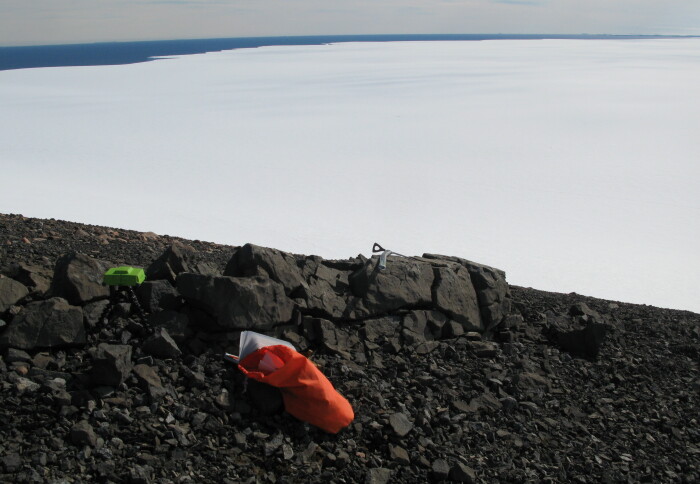Smart materials and Pine Island puzzles: News from the College

Pine Island Bay and Glacier
Here’s a batch of fresh news and announcements from across Imperial.
From smart materials to melting glaciers, here is some quick-read news from across the College.
Smart materials funding
 Imperial researchers are part of a £7M award for quantum engineering of energy-efficient organic smart materials, led by the University of Lancaster. The five-year project funded by the EPSRC entitled ‘Quantum engineering of energy-efficient molecular materials (QMol)’ aims to develop new disruptive materials for everything from smart textiles to self-powered patches for healthcare.
Imperial researchers are part of a £7M award for quantum engineering of energy-efficient organic smart materials, led by the University of Lancaster. The five-year project funded by the EPSRC entitled ‘Quantum engineering of energy-efficient molecular materials (QMol)’ aims to develop new disruptive materials for everything from smart textiles to self-powered patches for healthcare.
Integrating wearable electronic devices into clothing faces a key challenge: the need for a power supply that needs to be recharged. Inorganic thermoelectric (TE) materials hold some promise but have low efficiency, so the QMol researchers plan to develop flexible TE materials based on organic materials that can convert waste heat from the body and other sources into electricity.
Alongside this, they will develop new ‘memristors’, which are low-power devices able to simulate the synapses in our brain and also to act as interesting sensors. The creation of these materials will be based on a series of recent discoveries by the researchers, including quantum interference effects, strategies for controlling molecules and their configuration, and the ability to print such architectures.
Co-investigators from Imperial, which receives around £3m of the award, are: Professor Lesley Cohen (Physics), Professor Nicholas Long (Chemistry), and Dr Felice Torrisi (Chemistry).
Pine Island puzzle
 New research published in Geology has found evidence that Pine Island Glacier, a large ice stream in West Antarctica that is around the same size as Great Britain, was hundreds of metres thicker in the past and thinned rapidly about seven thousand years ago. The findings could be used to inform numerical models that simulate the future of this glacier in a warming world, including, most importantly, how quickly it'll add to sea level.
New research published in Geology has found evidence that Pine Island Glacier, a large ice stream in West Antarctica that is around the same size as Great Britain, was hundreds of metres thicker in the past and thinned rapidly about seven thousand years ago. The findings could be used to inform numerical models that simulate the future of this glacier in a warming world, including, most importantly, how quickly it'll add to sea level.
Pine Island Glacier is of particular interest to scientists, as it is currently Antarctica's largest contributor to ongoing sea level rise, contains enough ice alone to raise global sea level by about 0.6 metres, and could be susceptible to very quick "runaway" retreat due to the shape of the land it sits on.
The data gathered from rocks deposited on mountain surfaces above the ice sheet show that this large glacier thinned rapidly in the last few thousand years.
Lead author Dr Keir Nichols of Imperial’s Department of Earth Science and Engineering said: “While past thinning was rapid, thinning today is even quicker, so our new findings help to place ongoing change into the context of the past. We also show how the glacier retreated laterally as well as thinning vertically.
“We can now use these constraints on past change to inform numerical models that predict the effects of manmade climate change on Pine Island Glacier and wider Antarctica.”
'Offshore-onshore record of Last Glacial Maximum−to−present grounding line retreat at Pine Island Glacier, Antarctica' was published in Geology.
Royal Society Award
 Professor of Space Physics and Head of the Department of Physics, Michele Dougherty, has won one of the Royal Society’s premier awards: the Bakerian Medal and Lecture.
Professor of Space Physics and Head of the Department of Physics, Michele Dougherty, has won one of the Royal Society’s premier awards: the Bakerian Medal and Lecture.
This is the premier lecture in physical sciences, established in 1775, and is awarded to Professor Dougherty for her scientific leadership of the Cassini magnetic field instrument at Saturn, seminal research findings on potential life support on Enceladus and leadership of forthcoming missions to probe Jupiter’s icy moons.
Professor Dougherty was recently voted President-Elect of the Institute of Physics for a two-year term from October 2023, after which she will serve as President for two years. She was awarded a CBE in the 2018 New Year's Honours list for services to UK Physical Science Research.
In 2017, she became only the fifth woman to be awarded the Royal Astronomical Society's gold medal for geophysics, recognising lifetime achievement in the field. She is also a Royal Society Fellow, a member of the Science and Technology Facilities Council at UK Research and Innovation (UKRI) and an honorary international member of the American Academy of Arts and Sciences.
 Want to be kept up to date on news at Imperial? Sign up for our free quick-read daily e-newsletter, Imperial Today.
Want to be kept up to date on news at Imperial? Sign up for our free quick-read daily e-newsletter, Imperial Today.
Article text (excluding photos or graphics) © Imperial College London.
Photos and graphics subject to third party copyright used with permission or © Imperial College London.
Reporter
Bryony Ravate
Communications Division
Corinne Farrell
Communications Division
Hayley Dunning
Communications Division
Caroline Brogan
Communications Division